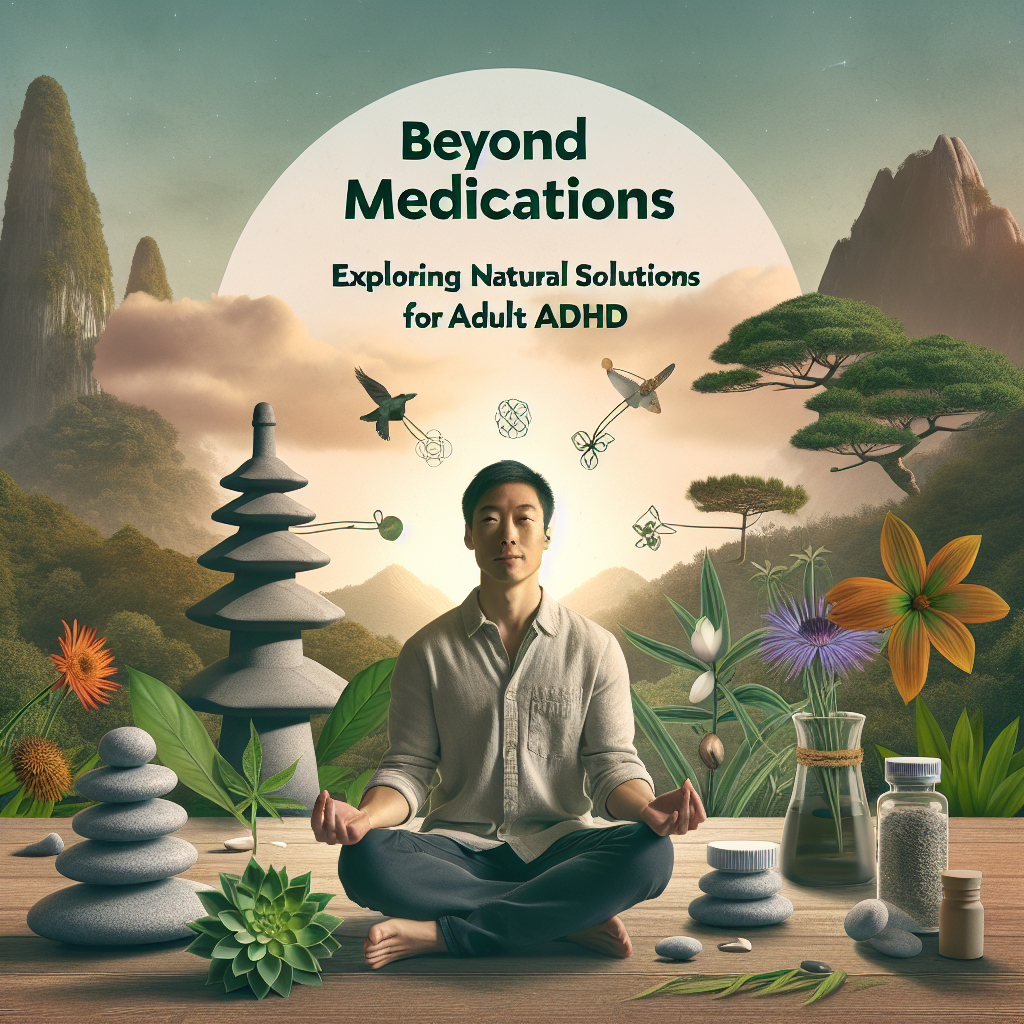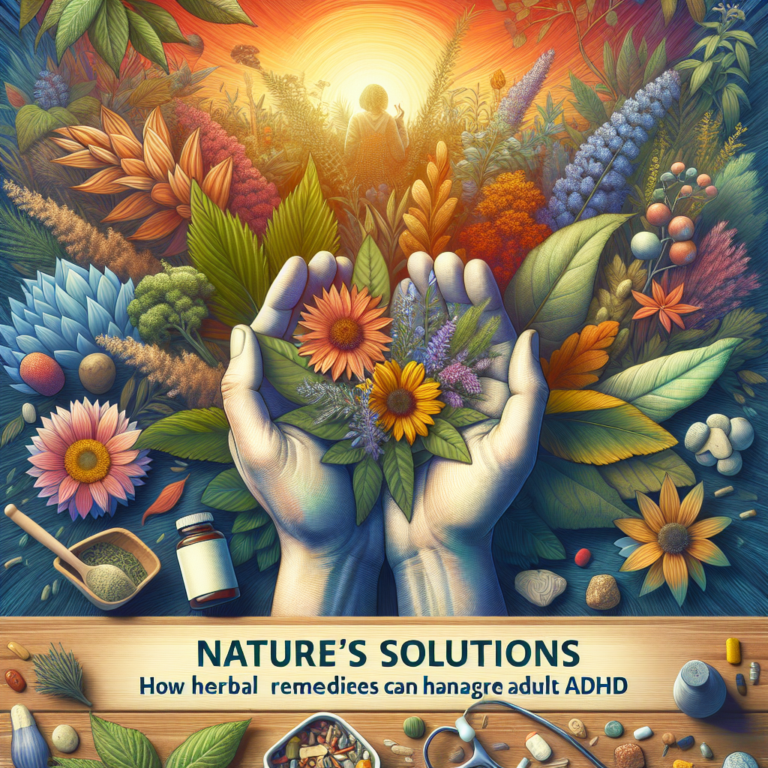
Beyond Medications: Exploring Natural Solutions for Adult ADHD for Lasting Change
Introduction
Imagine waking up each day full of potential, yet feeling like you’re constantly running on a treadmill that never stops. For many adults with Attention Deficit Hyperactivity Disorder (ADHD), this is a reality. While medications can offer some relief, they are not the only way to manage this often-misunderstood condition. In fact, exploring natural solutions for adult ADHD may provide sustainable benefits that improve quality of life, productivity, and mental clarity. In this article, we’ll delve deep into the various natural approaches, backed by research and real-life examples, to find optimal strategies for managing adult ADHD beyond medications.
Understanding Adult ADHD
Before we can explore natural solutions, it’s essential to understand what ADHD looks like in adults. Symptoms can manifest as:
- Inattention: Difficulty concentrating, forgetfulness, and disorganization.
- Hyperactivity: Restlessness, impulsive behaviors, and difficulty staying still.
- Emotional Dysregulation: Mood swings, frustration, and difficulty managing stress.
These symptoms often result in challenges in relationships, work environments, and everyday life, making it vital to explore effective strategies for improvement.
The Limitations of Medications
While medications such as stimulants (e.g., Adderall, Ritalin) can provide quasi-instant relief, they may also come with side effects like insomnia, appetite suppression, and increased anxiety. Furthermore, not everyone responds positively to these medications. This is where the importance of exploring natural solutions for adult ADHD comes into play.
Key Considerations
- Tailored Approaches: Individual responses to ADHD treatments vary widely, warranting exploration of multiple avenues.
- Holistic Well-being: A comprehensive approach can address not just ADHD symptoms, but overall mental health.
Natural Solutions for Adult ADHD
1. Nutrition and Diet
Impact of Diet on ADHD Symptoms
Recent studies suggest that certain dietary changes can have a significant impact on managing adult ADHD symptoms. This includes incorporating omega-3 fatty acids, antioxidants, and micronutrients into your diet.
Key Nutritional Strategies
- Omega-3 Fatty Acids: Found in fish, walnuts, and flaxseeds, omega-3s are crucial for brain health. Research indicates that adults with ADHD often have lower levels of omega-3s.
- Balanced Meals: Consistent meals that incorporate proteins, carbohydrates, and fats can stabilize energy levels and focus.
| Food Type | Benefits for ADHD | Sources |
|---|---|---|
| Omega-3s | Enhances cognitive function | Fish, walnuts, flaxseeds |
| Proteins | Sustains energy for longer | Chicken, beans, lentils |
| Antioxidants | Reduces oxidative stress | Berries, leafy greens, nuts |
2. Exercise
Physical Activity as a Natural Solution
Regular physical activity isn’t just good for your body; it can also significantly improve mental clarity and attention. According to a study published in The Journal of Attention Disorders, physical activity can serve as an effective treatment for ADHD symptoms.
Key Tips
- Daily Exercise Recommender: Aiming for at least 30 minutes of moderate activity, five times a week can be beneficial.
- Mindful Movement: Practices like yoga or tai chi can help improve focus and reduce anxiety.
3. Mindfulness and Meditation
Mindfulness practices have shown promise in helping adults with ADHD heighten their awareness and manage impulsivity.
Case Study: John’s Journey
John was a 34-year-old graphic designer who struggled with attention and impulsivity. After chronicling his journey through meditation, he reported improvements in focus and emotional regulation. By incorporating just 10 minutes of mindfulness each day, he felt more centered and productive at work.
4. Sleep Hygiene
A good night’s sleep is critical for cognitive function. Adult ADHD sufferers often struggle with sleep disturbances, aggravating their symptoms.
| Sleep Tips | Benefits |
|---|---|
| Consistent Schedule | Helps regulate circadian rhythm |
| Digital Detox | Reduces distractions before bed |
| Relaxation Techniques | Prepares your mind for restful sleep |
5. Herbal Supplements
While research is still emerging, certain herbal supplements have been identified as promising candidates for managing ADHD symptoms.
Popular Options
- Ginkgo Biloba: May enhance cognitive function and improve attention span.
- Bacopa Monnieri: Traditionally used in Ayurvedic medicine, it’s believed to support memory and cognitive function.
Exploring Behavioral Therapies
Behavioral therapies emphasize changing specific behaviors and developing coping strategies. These therapies can be particularly beneficial when combined with natural solutions for adult ADHD.
Cognitive Behavioral Therapy (CBT)
CBT is a structured, time-limited approach that can help individuals with ADHD identify negative thinking patterns, develop self-awareness, and improve interpersonal skills.
Case Study: Sarah’s Transformation
Sarah, a 28-year-old marketing professional, struggled to manage her workload. After engaging in CBT alongside nutritional improvements, she found herself more organized and had better interactions with coworkers.
Building a Support Network
Support networks, including family, friends, and support groups, can provide encouragement, accountability, and helpful tips based on shared experiences.
Engaging Community Resources
- Local Support Groups: Connecting with others who share similar challenges can provide emotional support and proven strategies.
- Online Forums: Online communities offer a platform where individuals can share successes, questions, and advice.
Conclusion
Beyond medications: Exploring natural solutions for adult ADHD presents a multi-faceted approach to managing symptoms and enhancing quality of life. Nutritional changes, exercise, mindfulness, sleep, and support systems can significantly improve focus and emotional regulation. Each person’s journey is unique, and no single approach is universally effective. By integrating a combination of these natural strategies, individuals can partly alleviate ADHD symptoms, leading to a more fulfilling and productive life.
Actionable Insights
- Start small: Incorporate one new strategy each week.
- Track your progress: Keep a journal of what works and what doesn’t.
- Seek professional guidance when necessary; a holistic approach is often most effective.
FAQs
1. Can ADHD be managed without medication?
Yes, many individuals find success in managing ADHD symptoms through natural solutions such as dietary changes, exercise, and mindfulness practices.
2. Are herbal supplements safe for treating adult ADHD?
While some herbal supplements may provide benefits, it’s essential to consult a healthcare professional before starting any new supplement regimen.
3. How does diet impact ADHD symptoms?
A balanced diet rich in omega-3 fatty acids, proteins, and antioxidants can help improve attention and reduce impulsivity.
4. What role does sleep play in managing ADHD?
Quality sleep is crucial for cognitive function and emotional regulation. Good sleep hygiene practices can positively affect ADHD symptoms.
5. Are behavioral therapies effective in managing ADHD?
Yes, therapies like Cognitive Behavioral Therapy (CBT) can aid in developing coping strategies and organizational skills, enhancing overall management of ADHD symptoms.
By looking beyond medications, individuals can explore various natural solutions for adult ADHD, arming themselves with tools that foster true wellness and balance in their lives.















